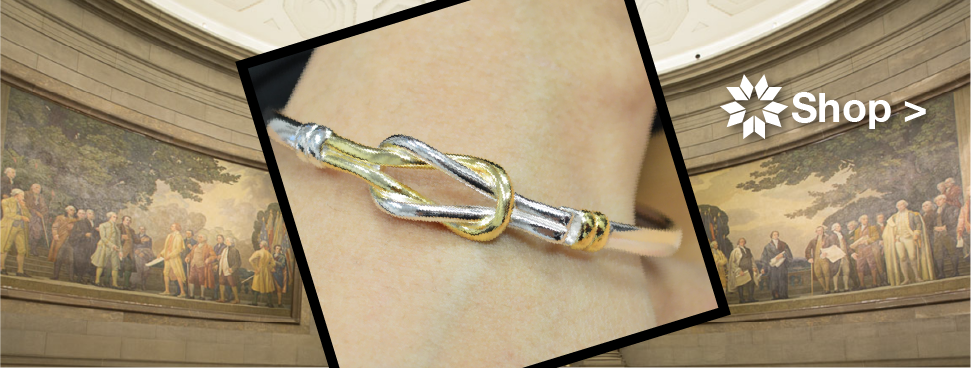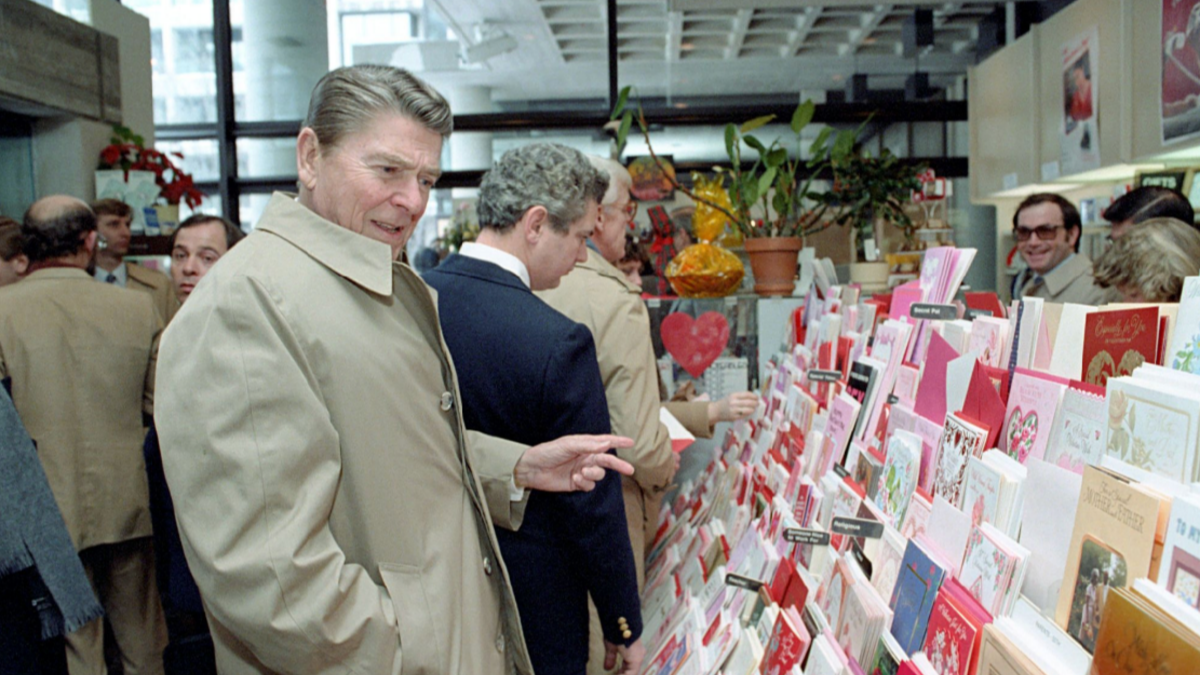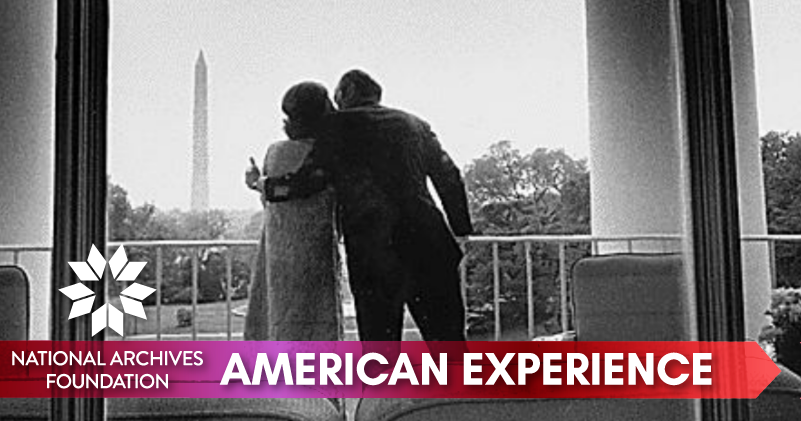Archives Experience Newsletter - February 15, 2022
Dating History
With the ubiquity of dating apps, texts that fly back and forth, and the ability to vet potential romantic partners via social media, you’d think that dating has never been easier. While the ways we meet and communicate may have changed, the emotional minefield of dating remains the same. History does, in fact, repeat itself.
From old parchment letters to social media likes, young love blooms as it always has – over time. When you’re awaiting responses, feelings of excitement and anxiety persist regardless of the medium, whether you’re staring at a mailbox or carefully watching a brightly lit phone screen. And yes, generations have jumped through hoops in pursuit of love – parental approval, dealing with distance, and talking about “labels.”
Whether you’re looking for love in all the wrong places or relieved your dating days are done, we hope you take these records of love to heart.

Patrick Madden
Executive Director
National Archives Foundation
Affairs of the Heart
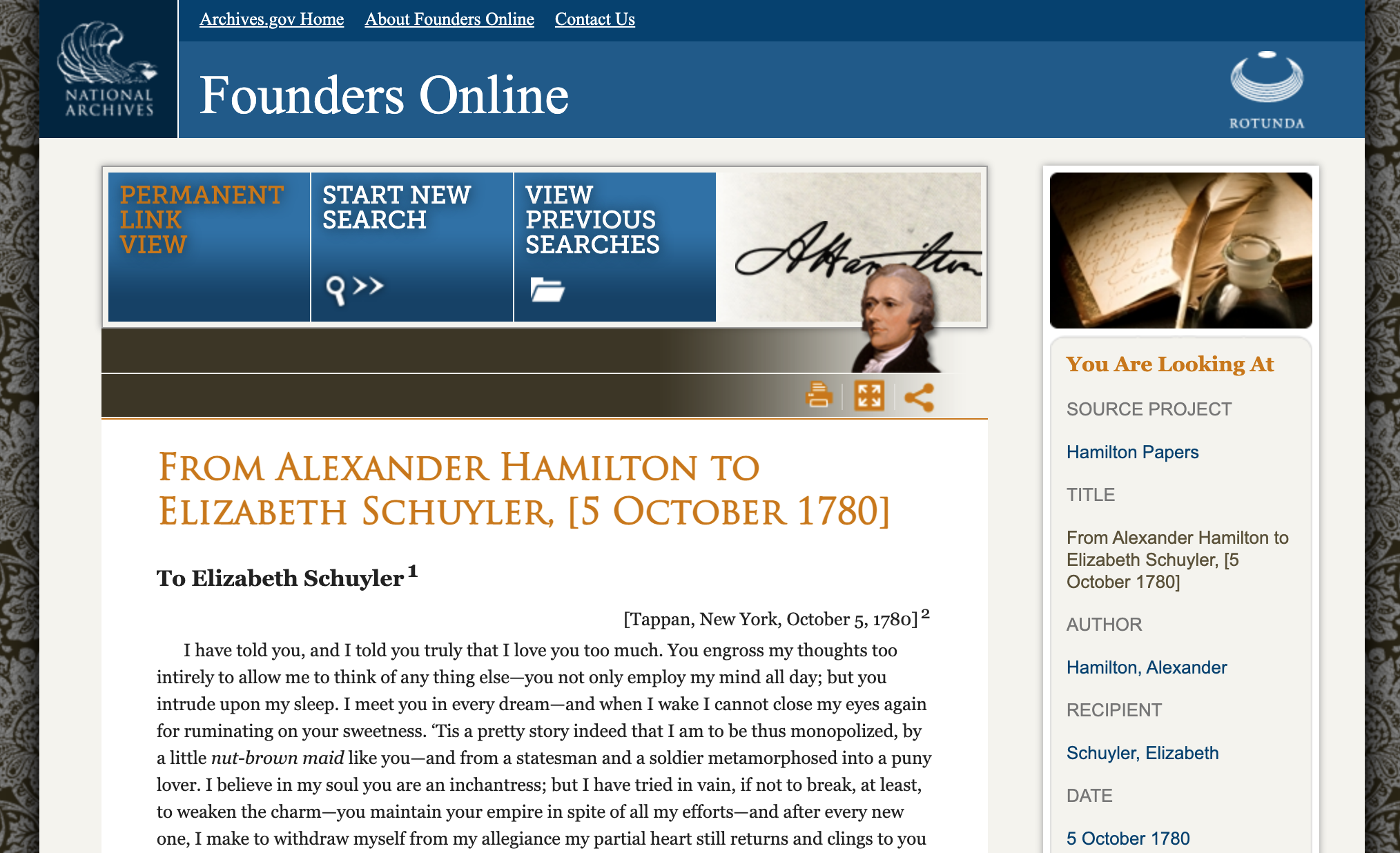
October 5th, 1780
Alexander Hamilton first met Elizabeth “Eliza” Schuyler briefly in 1779 at her family’s home in Albany, New York, when he and General George Washington were passing through the area. Hamilton was Washington’s aide-de-camp, a pretty astonishing achievement for a penniless orphan from the island of Nevis. Local businessmen on the island had recognized Hamilton’s brilliance and sent him abroad to continue his education. Eliza was pretty much Hamilton’s complete opposite—brought up in a prominent family, wealthy, educated, and accustomed to moving in the best social circles.
But when they met again at Eliza’s aunt’s house in the winter of 1780, they were both immediately smitten. They started corresponding, and their letters left no doubt about their intentions.
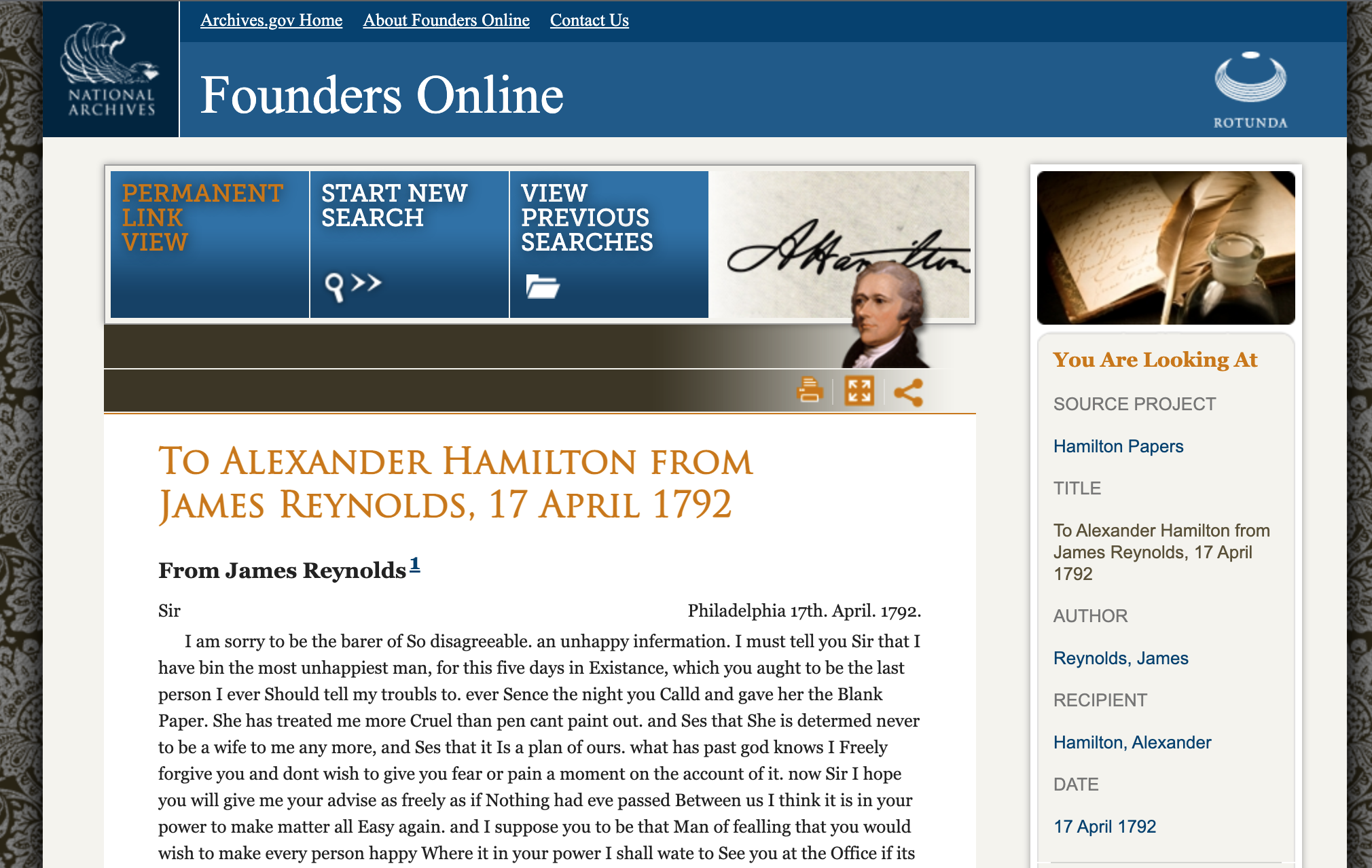
April 17, 1792
Oh, but even the sweetest love stories sometimes get sidetracked. In the summer of 1791, while his wife and children were vacationing in Albany, Hamilton embarked on an affair with Maria Reynolds, a married woman who asked him to help her leave her abusive husband and return to New York. When Maria’s husband, James Reynolds, found out about the affair, he quickly resorted to blackmailing Hamilton for considerable amounts of cash. Hamilton complied to keep the situation quiet, but before long, the whole sordid mess became public.
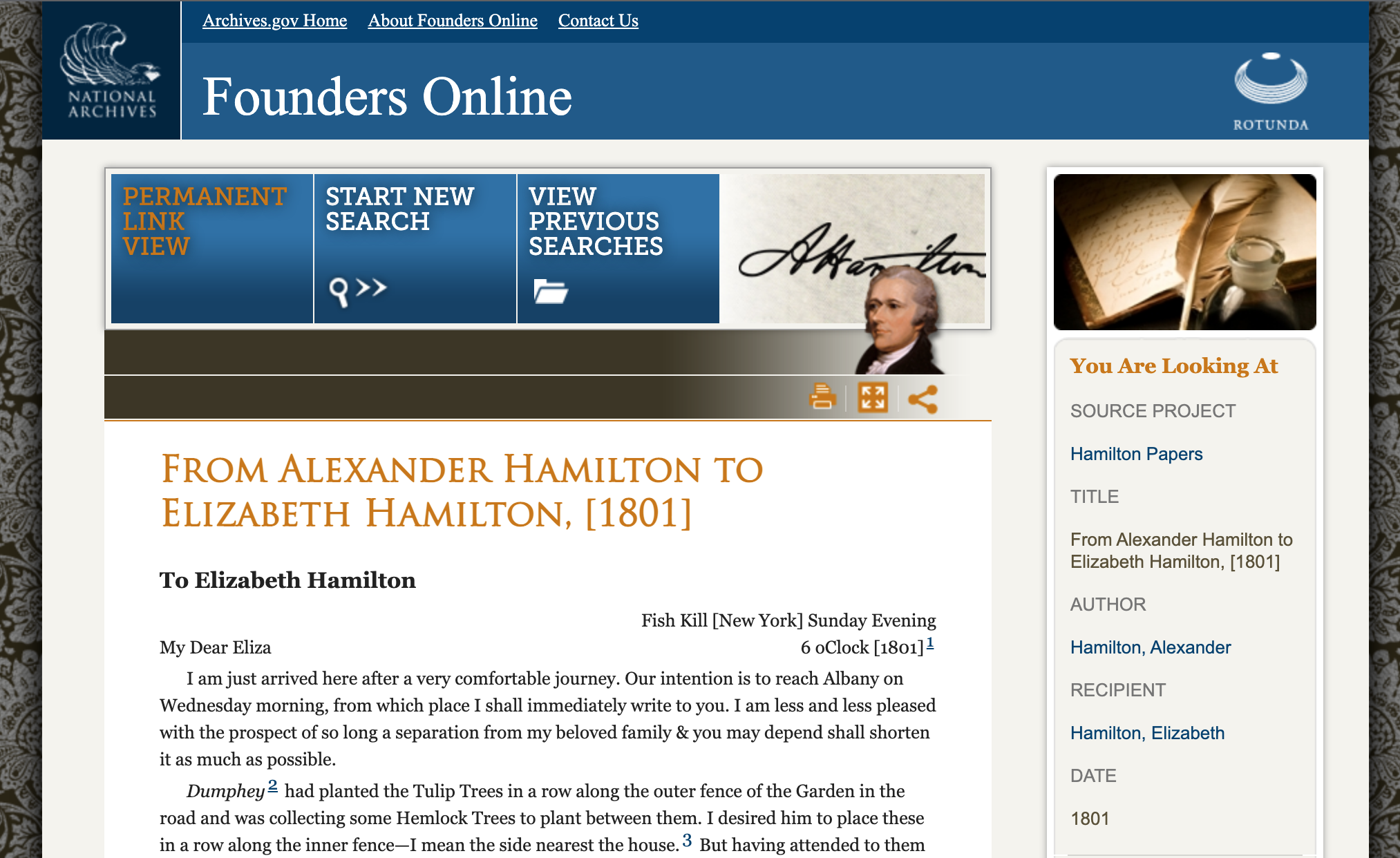
1801
Throughout it all, Eliza stood by her man, but she doubtless felt humiliated by the situation. And in many ways, things went from bad to worse for the Hamiltons. In 1801, their eldest son Philip died in a duel with George Eacker. Three years later, Aaron Burr fatally shot Alexander Hamilton in a duel outside Weehawken, New Jersey, in the same spot where Philip had been shot. After her husband’s death, Eliza requested, and received, funds from Congress for the preservation of all of his papers. (There were a lot – he wrote like he was running out of time!) Eliza outlived her husband by fifty years, passing away in Washington, D.C., on November 9, 1854, at the age of 97.
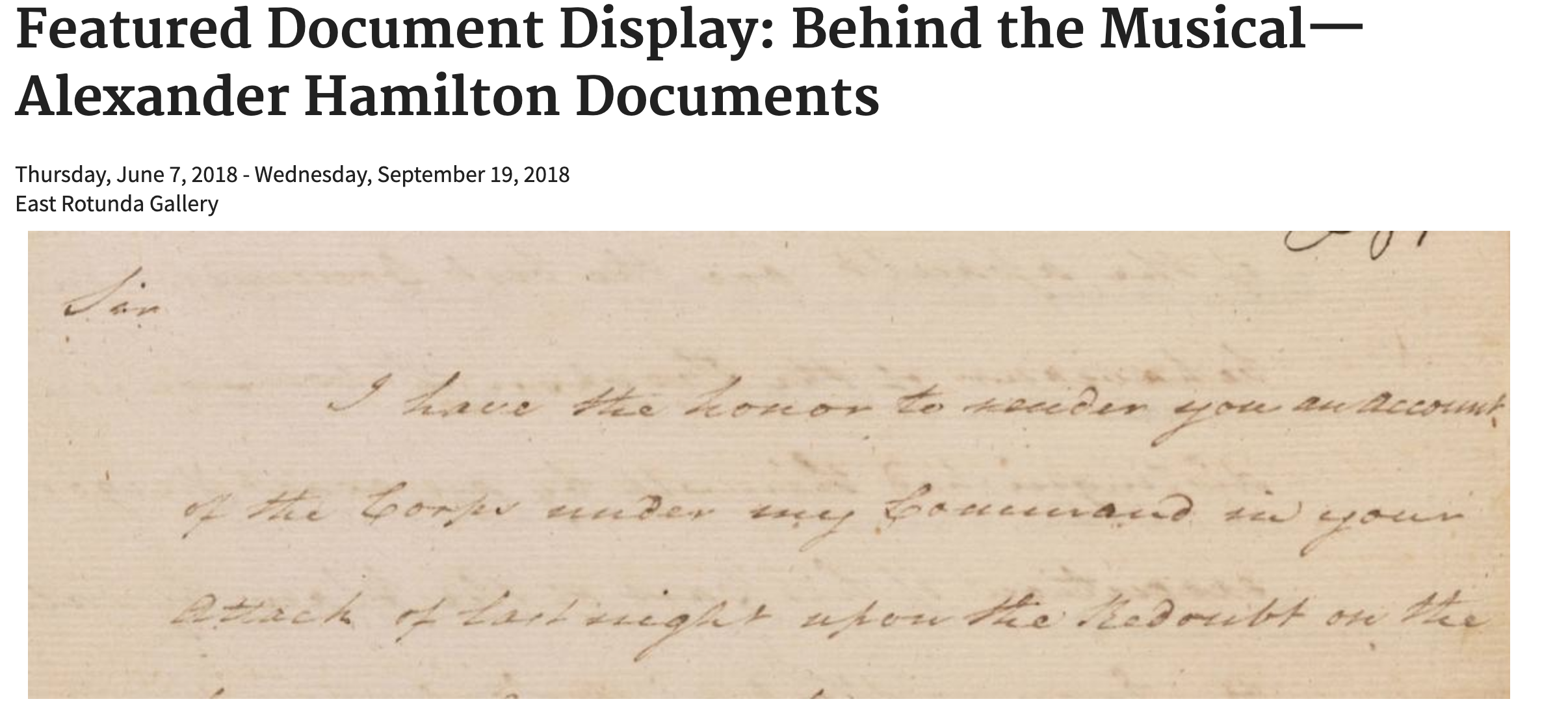
Defining the Relationship
Sometimes, the person you’re dating may have ulterior motives for keeping company with you. It might be trivial or monumental—maybe they like your dog more than they like you, or your car more than they like theirs, or the fact that you make more money than they do.

Or it could be something truly earth shattering. Take, for example, the case of Henry Wilson and Rose O’Neal Greenhow, whose purported love affair blossomed and perished during the Civil War. Wilson was a Republican Senator from Massachusetts and an avowed abolitionist who had the misfortune to fall in love with Greenhow, a beautiful, charming, Maryland-born widow of a prominent and wealthy doctor who was living in Washington, D.C. She was also a spy who was passing detailed messages to the Confederacy right under the noses of the U.S. Department of War.
Wilson was a member of the Military Affairs Committee, so he was privy to much important information about the war. And he was apparently head over heels in love with Rose Greenhow, showering her with love letters that are now in the holdings of the National Archives. Greenhow claimed he was one of her most important sources of information, although some scholars dispute that contention.
In 1861, the Secret Service placed Greenhow under house arrest. She was moved to Old Capitol Prison in 1862 and then released without having been tried the next year. She and her daughter left Washington for Richmond, Virginia, where Jefferson Davis sent her to Europe as a courier on behalf of the Confederacy. Greenhow managed to elude the blockade that had Southern harbors bottled up, and she spent the next two years in Europe, persuading foreign governments to support the Southern cause. When she returned to the U.S. on the British ship Condor in 1864, the ship ran aground, and Greenhow drowned.
Getting Ghosted
So you’ve been dating someone for a little while, and it’s going great, you really like them, you have a lot to talk about, you have plenty in common, and then suddenly—they vanish. No more texts, no more phone calls, no more dates, nada, nothing, zip. You’ve been ghosted.
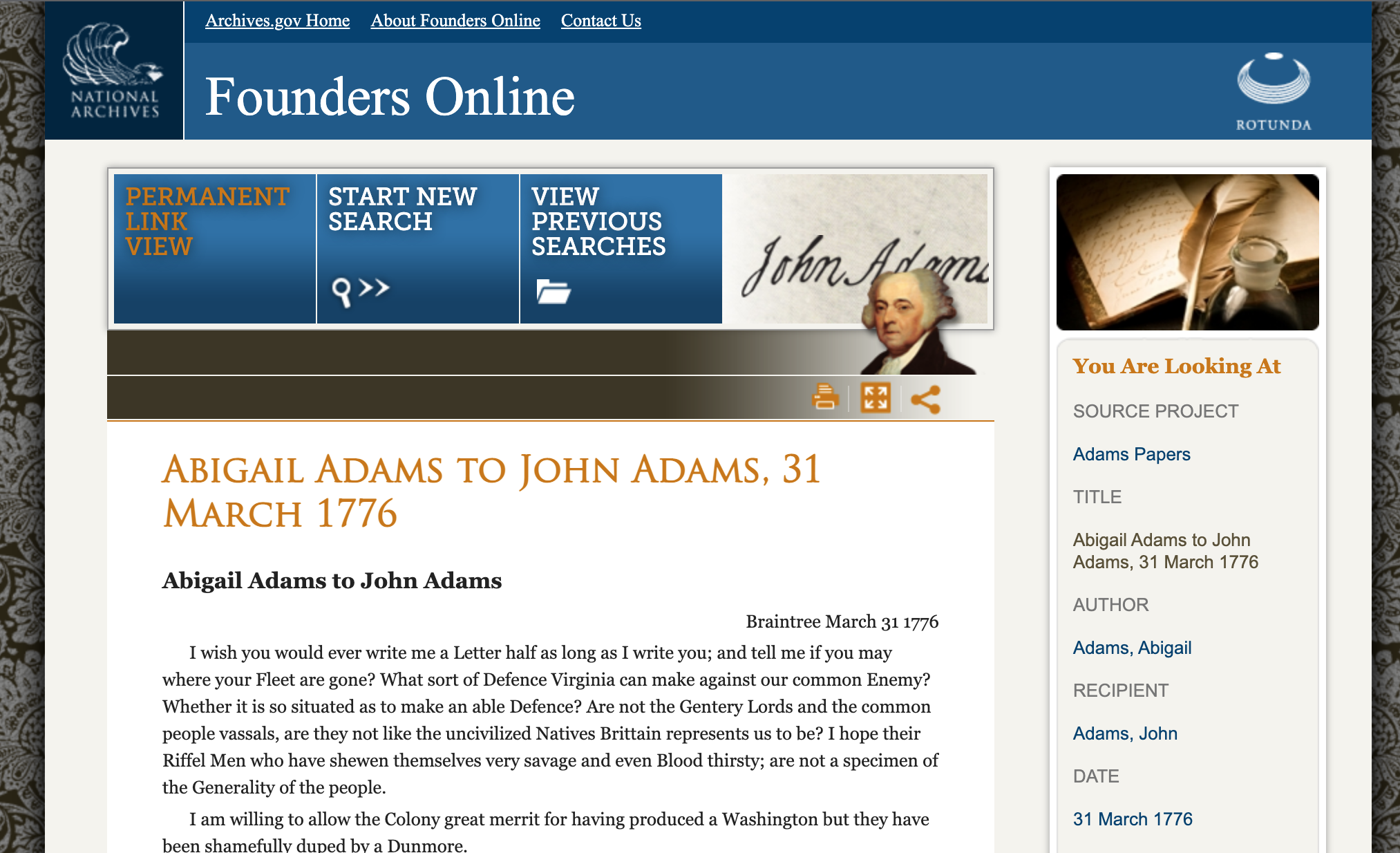
March 31st, 1776
It’s bad enough when you’re dating, but imagine that you’ve been married for more than a decade, and your husband is away on business, and he’s suddenly quit answering your letters! Your country is at war, you’re struggling to keep the family business afloat, and you haven’t heard a word from him—sometimes for months at a stretch!
“I wish you would ever write me a Letter half as long as I write you; and tell me if you may know where your Fleet are gone?,” Abigail Adams wrote to John Adams on March 31, 1776. Wait—Abigail and John Adams? That famous pair of lovebirds, they of the heartrending affirmation, “I am as I ever was and ever shall be, Yours, Yours, Yours”?
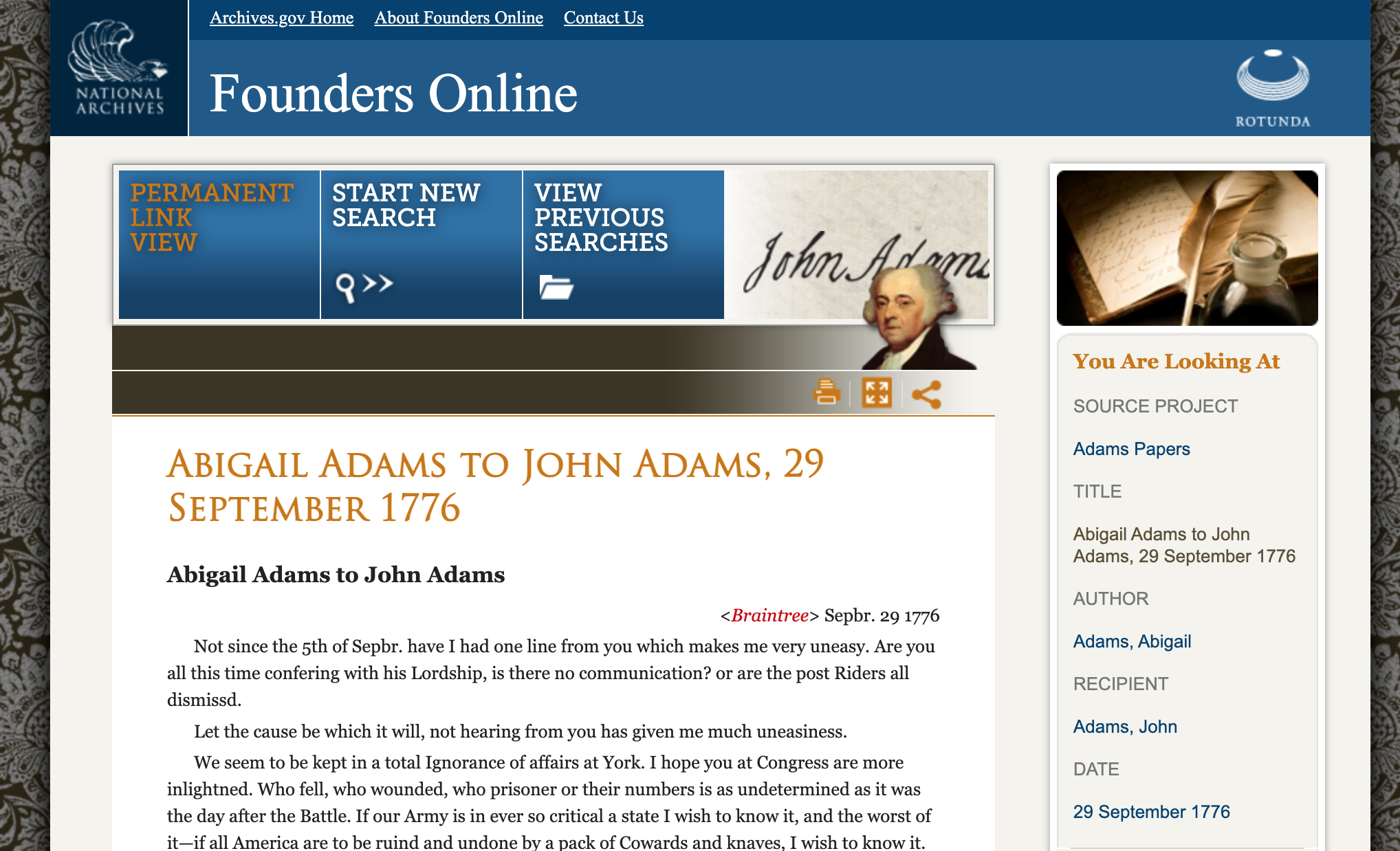
September 9, 1776
Yes, those two. Even after Abigail reproached him that March day, John apparently was very tardy in replying to his wife. “Not since the 5th of Sepbr. have I had one line from you which makes me very uneasy,” she wrote him on September 29, 1776. “Are you all this time conferring with his Lordship, is there no communication? or are the post Riders all dismissed….Let the cause be which it will, not hearing from you has given me much uneasiness.”
In truth, John Adams had good reason to be reluctant about sharing much detail about the colonists’ defenses with his wife—the British were intercepting his mail, and he was rightfully concerned that anything he told her about the war effort might fall into the wrong hands. Still, it wouldn’t have hurt him to write to her more often, even if what he had to say wasn’t very interesting. Sometimes it’s not so much what you say as the fact that you take the time to say it.

Parental Disapproval
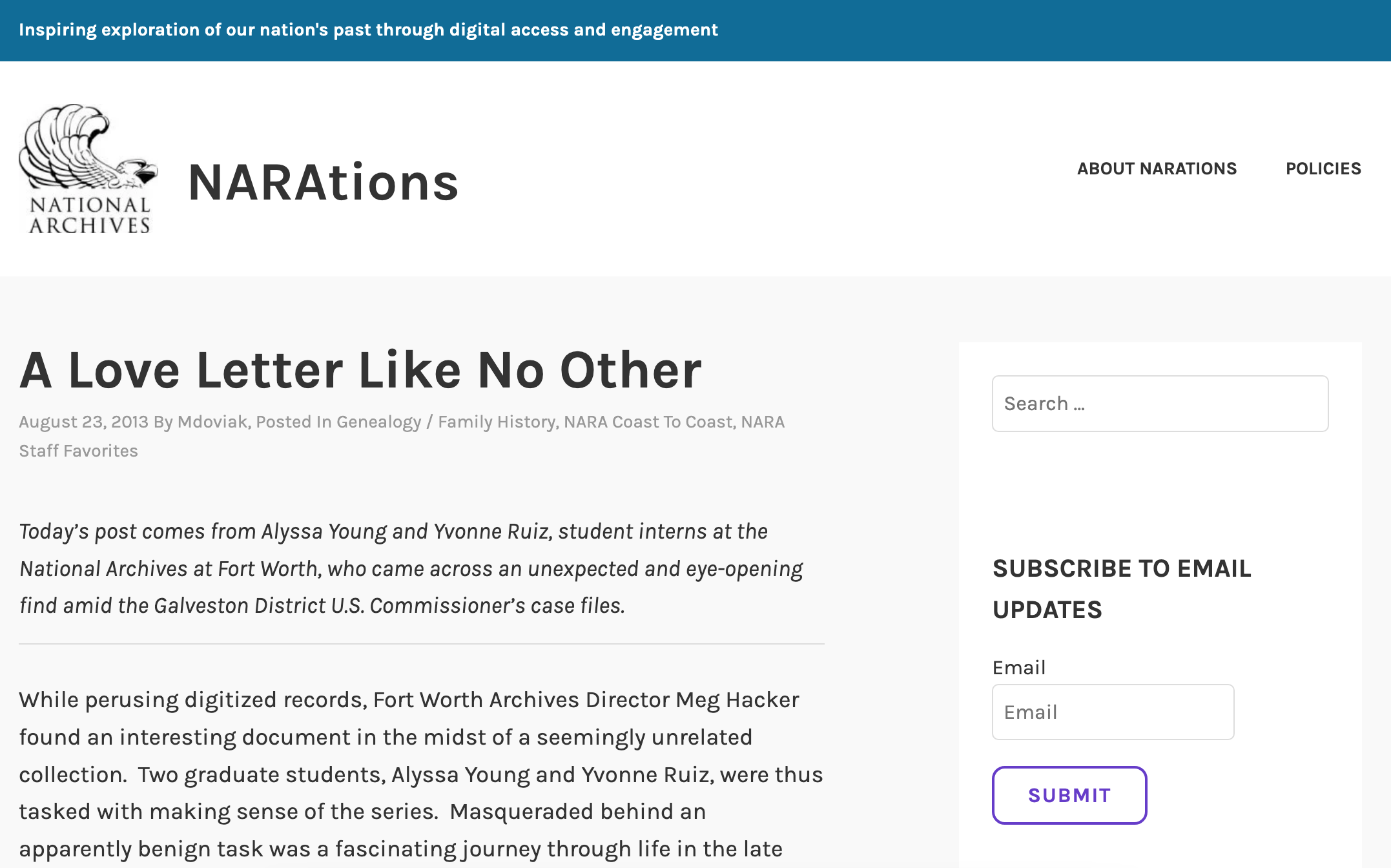
Parental disapproval of the person you’re dating is nothing new—after all, it’s the basis of Romeo and Juliet and West Side Story. But it might surprise you to learn that the National Archives is the repository of some pretty steamy love letters that a young man sent to his prospective lover in 1894. And her mother most decidedly was not in favor of their association.

Sam McGee was nineteen when he wrote a letter to “Lillie Dear,” declaring, “I write because I am in love with you.” Lillie was sixteen at the time, and her mother was not amused. She filed charges against Sam to stop him from seeing her daughter. His letter to Lillie and the letter he wrote in response are both in the holdings of the National Archives.
And despite her mother’s objections, Lillie and Sam were married a few years later. The 1910 census records that they were living in Houston with their daughter, where Sam was working as a porter. Even disapproving parents can’t stand in the way of true love.
A Childhood Crush
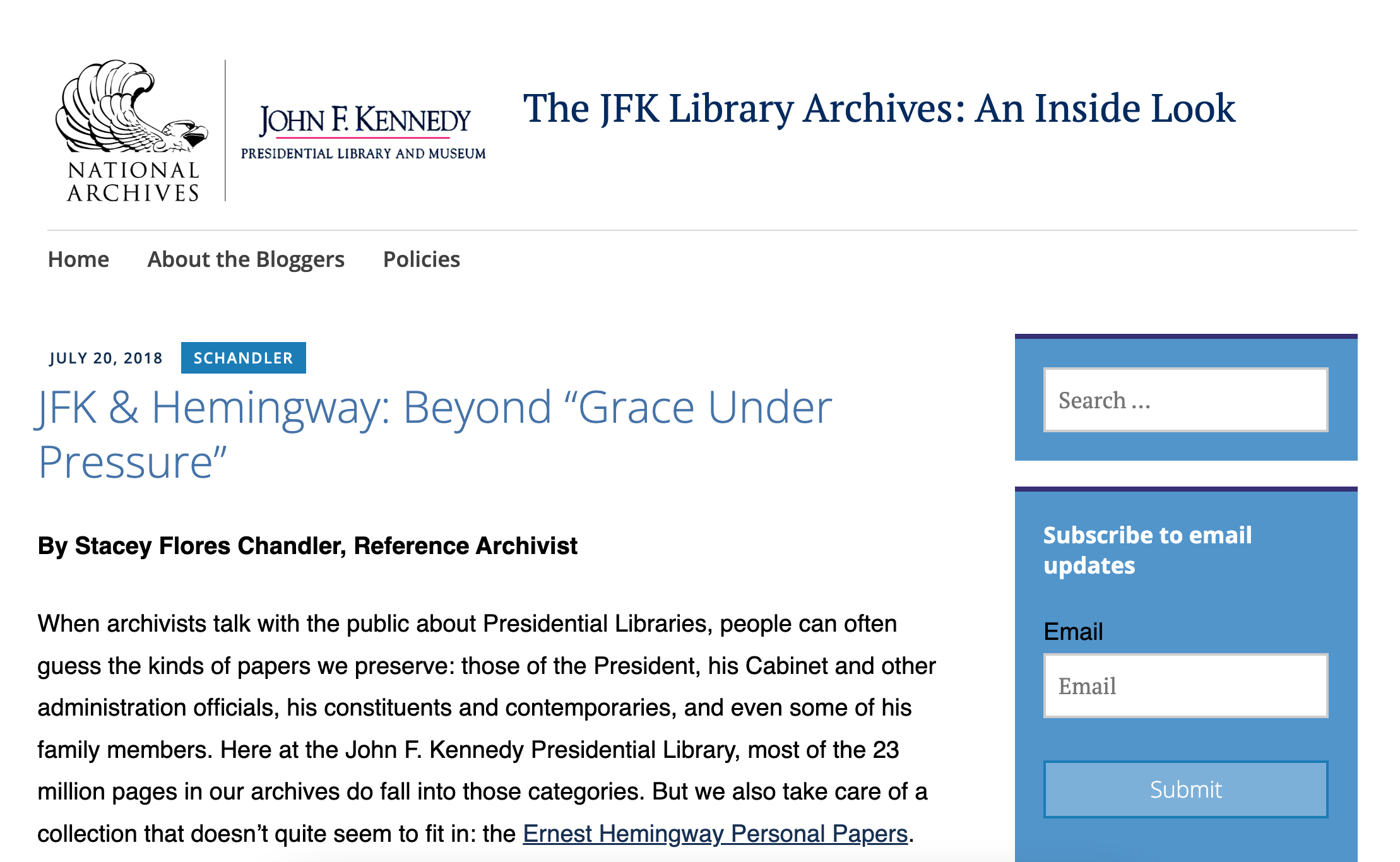
Imagine that you’re walking along one day, minding your own business, not paying any particular attention, when suddenly you come face to face with your literary crush! That’s exactly what happened to a teenaged John Fitzgerald Kennedy when he ran into the legendary writer Gertrude Stein. She apparently cheerfully signed his autograph album. It seems that even at a tender age, JFK was not so starstruck that he couldn’t rise to the occasion! His autograph book is in the collection of the John F. Kennedy Presidential Library and Museum.
